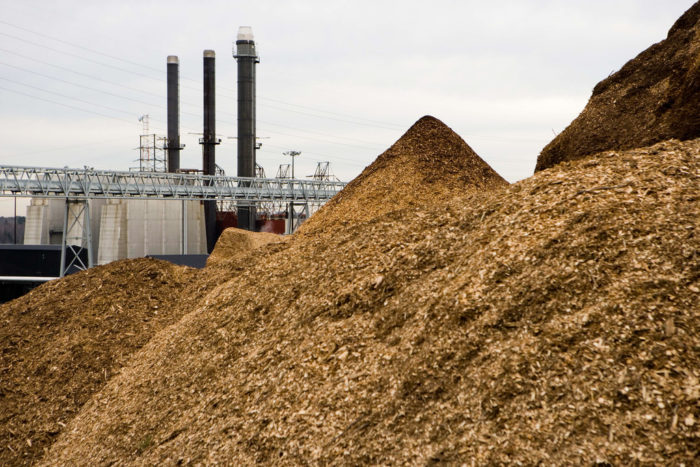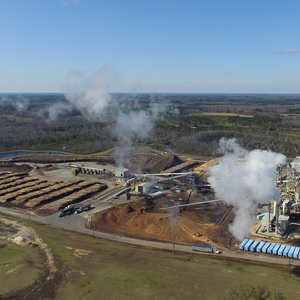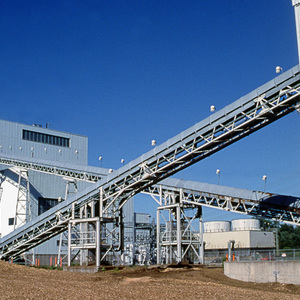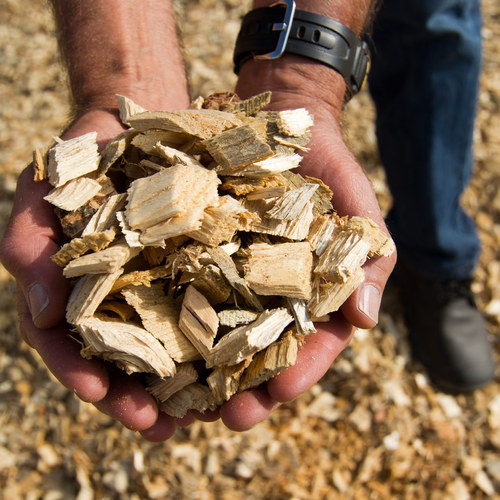
Image Credit: PSNH/ Creative Commons license/ Flickr
Two biomass-fueled electricity generating plants in Maine with a combined output 50 megawatts will close in March after the owner said that earnings from electricity sales were not enough to cover operational and fuel costs.
The identical plants are located in West Enfield and Jonesboro, in rural northern and eastern Maine, and employ a total of 44 people. Between them, the plants burn 1,100 tons of wood fiber per day.
Covanta Holding Corporation, which has owned both plants since 2008, wasn’t specific about how much it earns for the power in generates. James Regan, the company’s director of communications, said that lower commodity prices for natural gas and oil have depressed pricing for biomass-generated electricity as well.
“Unfortunately, this happens with some frequency in the biomass industry when energy prices are not sufficient to cover the costs of operation and fuel supply,” the company said in a prepared statement. “We have experienced similar situations in the past and resumed operations when the economics improved. We will continue to evaluate the future of the facilities.”
Contacted by telephone, Regan would not say what the price per kilowatt-hour is now, or what pricing would have to be before the plants might be reopened. Covanta’s contracts for the sale of the power, however, are apparently not fixed over a long period of time but can fluctuate depending on market conditions.
“I can’t speak specifically on the downslide or when it started. I just don’t have those numbers and figures in front of me,” he said. “But yes, they’ve decreased and that’s led us to take these plants off line at the end of March.”
The two Maine plants are the last of Covanta’s biomass facilities round the country to close. Six others in California already have been shuttered. The company mainly operates waste-to-energy plants, Regan said.
Although rising prices for biomass-generated electricity could bring the plants back online, there’s no guarantee they will reopen, Regan said. Asked whether the plants are now on the market, he said, “I can’t say. As I said, we’ll continue to evaluate all options with the facilities.”
Loggers fear many job losses
The Professional Logging Contractors of Maine (PLC) said that the closures will affect more than 2,500 jobs, according to an article in The Portland Press Herald.
The paper said that biomass accounts for 60% of the state’s renewable energy portfolio and 27% of its electricity generation overall.
Dana Doran, executive director of the PLC, said that the state’s biomass industry offers a number of advantages, including direct and indirect jobs and tax revenues, even if the electricity costs a little more. Also, he said, the plants will be important when prices for fossil fuels inevitably rise again.
In a written statement, the group called the decision to close the plants a “huge blow to the logging industry in Maine.” Expiring renewable energy subsidies in Massachusetts and Connecticut have the potential to eliminate the market for Maine biomass completely as soon as next year, the statement said.
Four other biomass plants under different ownership are still operating in the state.
Weekly Newsletter
Get building science and energy efficiency advice, plus special offers, in your inbox.















4 Comments
Units of Measure Need Fixing
I think there is a common, incorrect unit used in the article. Power and energy, and units of measure MW and MWh, are also commonly misused in my local newspaper.
Given that the two plants mentioned each are rated at 24.5MW, either they only run one hour each day or the "50 megawatt hours of electricity per day" should be just "50 megawatts".
Thanks, C.B.
You're correct, and we've fixed the error. Thanks for letting us know.
Biomass plants closing
It is always disappointing when renewable energy fails to compete. My first question would be, are there subsidies for biomass just like there for oil, gas and other forms of energy?
What if these closing biomass plants converted to mulch-making and returned the carbon to the earth instead of burning it?
Reply to Gayle
Gayle-I live in Maine and am also disappointed in the biomass plant closures. As far as I know, there are no local subsidies for operators of biomass plants. Some states have renewable energy portfolio requirements so utilities are obligated to buy power from renewable sources up to a certain percentage of total power purchases.
Much of what gets burned is already close to mulch, in that it is wood chips or other types of waste from logging/lumber making. The problem is that the market for mulch is limited and I don't think could absorb the 1200 tons per day the plants are burning.
The logging, lumber producing, paper-making and biomass industries are interrelated. We have had several paper mills close in Maine in recent years because of a combination of lower paper use and outside competition. That reduces demand for pulp, so loggers lose a market for timber that isn't good enough to make into lumber but which is an inevitable by-product of logging for lumber.
Log in or create an account to post a comment.
Sign up Log in